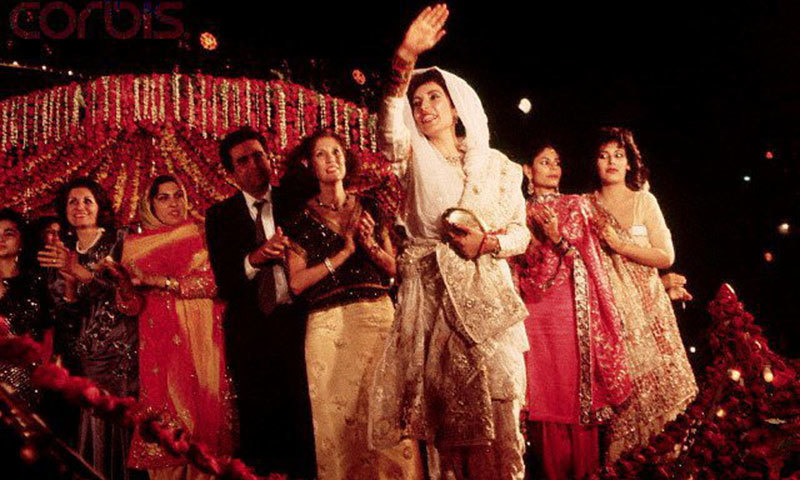On July 29, 1987, a few members of the Bhutto family and some of their friends assembled at the London apartment of Sanam Bhutto, Benazir Bhutto’s sister. Despite the unfortunate events the family had braved, Begun Nusrat Bhutto appeared calm and composed. Among the guests were Hakim Ali Zardari, father of Asif Zardari, and his wife. A photographer was in attendance too.
After some time, Benazir Bhutto broke the silence. “This is Asif Zardari, my fiancé.”
The next day, a picture of the ceremony and an accompanying news item appeared in the media. Since she grew up in a liberal environment, her friends wondered why her marriage had been arranged. Many columnists conjectured that perhaps Benazir would retire from politics altogether after the wedding.
Much to the surprise of many, Benazir accepts an arranged marriage proposal. While some expected her to be sidelined thereafter, the marriage strengthened her hand in politics
As per the press release issued from London by the PPP, Benazir said: “Conscious of my religious obligations and duty to my family, I am pleased to proceed with the marriage proposal accepted by my mother, Nusrat Bhutto. The impending marriage will not in any way affect my political commitment to my country, my people or the trail blazed by Shaheed Zulfikar Ali Bhutto for a free, federal democratic and egalitarian Pakistan.
“I stand as one with my countrymen in repudiating tyranny and its terrible heritage. The people of Pakistan deserve a better, more secure future and I shall be with them in seeking it. ... In view of the carnage caused by the car bombs and the sectarian killings the ceremonies are being postponed. We cannot celebrate when our people suffer. Your suffering is our suffering. Our bond is beyond the vindictive grips of the tyrants. I shall be returning to Karachi shortly.”
On Feb 17, 1987, a huge marriage ceremony was organised in Karachi that bound the two influential families of the country into a relationship. Benazir Bhutto had married Asif Ali Zardari, son of Hakim Ali Zradari, a businessman and landowner. It was an arranged marriage, something stunning for Oxford and Harvard graduate Benazir but she had her reasons for that. According to her, she was introduced to Asif Ali Zardari only five days before agreeing to the proposal.
Whether Zardari’s family knew or not, there were many proposals for Benazir Bhutto while she was still a student at Oxford in 1986. And yet, Hakim Ali Zardari, an old companion of Z.A. Bhutto and a cinema owner in Karachi, proceeded with the proposal.
“His (Asif’s) only apparent vice, if it could be called that, was a passion for polo,” Benazir told Shyam Bhatia, an Indian journalist and long-time friend in her biographical work Goodbye Shahzadi.
It all began in London almost a year before the marriage. On July 29, 1987, Begum Nusrat Bhutto received a formal proposal by Zardari for Benazir Bhutto led by Zardari’s stepmother, Begum Zarin. Asif Ali was studying at the London School of Economics and intended to take up a housing business after completing his studies.
While in London, he occasionally visited Begum Nusrat Bhutto during Benazir’s exile days; during these visits, Asif earned Begum Bhutto’s confidence.
Reconciling herself with choosing an arranged marriage, especially in a society where she had studied and developed her sense of life, was a difficult task. Talking to American newspaper the Los Angeles Times before her wedding, she said: “I don’t really expect people in the West to understand. Every mother wants her daughter married and I felt obligations to my family and my religion.”
Begum Bhutto clearly told the Zardari family that since Benazir was in politics, she would continue doing so and no hurdles should ever be created for her. Once the proposal was accepted, there was no hassle for the ceremony. She asked her mother not to arrange dowry. When the probable date for marriage was fixed, Benazir asked to postpone it because of violence in Karachi. The date was then fixed to Dec 17, 1987.
Before the main occasion, Benazir published a brochure explaining the cultural customs and traditions like Mehendi, Mayoon and finally Rukhsati. Some Western journalists, who had become Benazir’s friends, came to Karachi to witness the marriage ceremony.
Benazir wanted to make it a historic event. That is why she refused to make it an occasion of a few people gathered in a five-star hotel. Kikri Ground in the heart of Karachi’s PPP stronghold of Lyari was selected. There were no formal invitations while members from both families as well as party supporters attended the occasion in their numbers.
Benazir was clad in a white silk tunic with gold embroidery and Asif wore a traditional Baloch turban and cream-colour traditional trousers. The Nikah ceremony took place amidst a huge crowd; it could easily be mistaken for a huge public meeting. Asif’s gift for Benazir was a heart-shaped ring, studded with diamonds and sapphires.
Beyond public scenes, both families held a number of private celebrations, but the change in the political life of the couple was immense. Asif quickly developed a taste for politics. After the 1988 elections, he played a crucial role in defeating Nawaz Sharif when he wanted to force a vote of no-confidence against Benazir.
Shyam Bhatia recalls his frank conversation with Benazir Bhutto before her wedding about an interested paramour. “There was, of course, no dearth of other Pakistani men who saw her as a great prize and would queue up for her hand. One was the son of a senior party functionary, but he was believed to have a drinking problem. Another party loyalist was also turned down by her because he came across as an opportunist, although he did win favour in a different way some years later when he was brought into the cabinet.”
Published in Dawn, Sunday Magazine, December 13th, 2015











































